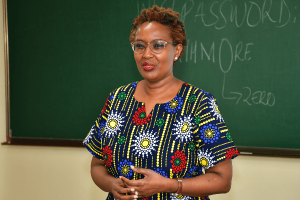Guest lecture: Civil Procedure during the COVID-19 Pandemic and Constitutional Principles

On 24 September 2020, second-year Strathmore Law School students had the wonderful opportunity to attend a guest lecture by Judge Francesca Fiecconi of Italy’s Supreme Court of Cassation. Among the three distinct Supreme Courts of Italy handling constitutional, civil, and criminal matters, Judge Fiecconi is one of the judges in the civil division, having joined it in 2017. A brief overview elaborated that these constitutional changes were effected after the Second World War and that the Italian Constitution is modelled on principles of Roman law as well as civil law. From the lecture titled, ‘Civil Procedure during the COVID-19 Pandemic and Constitutional Principles’, we acquired an informed perspective of the intricacies in incorporating constitutional pillars and legal principles in the Italian judicial system during the COVID-19 pandemic. Aside from this, we also drew insights on how the same can be implemented in our very own Kenyan judicial system.
Backbone of legal system
The five main constitutional pillars enshrined within the Italian laws include: The Constitution as the backbone of the legal system, the Supremacy of the Constitution, Constitutional Judicial Review, the Constitution as an intangible good, and International Constitutionalism, respectively. These, she said, succinctly address what it means to have a Constitution, with an emphasis on the fourth pillar; the Constitution as an intangible good. This was inferred to mean that the Constitution is a living document that informs the existence of government powers and social structures, as opposed to a book of dreams to be realized. She then elaborated that the Constitution is a document that can live independently without a government, since it is from it that the government stems. The centrality of these pillars in enforcing the Constitution as a tool to curtail arbitrary power as well as facilitate the enforcement of rights sheds light on the importance of their application in the Kenyan context.
Regarding civil suits during the pandemic, Judge Fiecconi explained the major strides Italy took in the quest to maintain the effectiveness of the judicial system during the pandemic. As exemplified by the judge, ‘the crisis cannot be used to excuse deficiencies in judicial systems or even less reduce standards or breach legal guarantees’. One of the ways Italy maintained the effectiveness of its judicial systems is through the declaration of principles implemented by the European Union Commission for the Efficiency of Justice (CEPEJ) which was aimed at supporting member states in enhancing the efficiency of their judicial systems according to the standards of the Council of Europe. These principles include Human Rights and Rule of Law, Access to justice, Safety of persons, Monitoring case flow, quality and performance, Cyber justice, Training, and Forward-looking justice. Currently, Italy is at the forefront in the application of the principles within their legal sphere.
Adoption of online services
Despite the closing of the courts, Italy adopted online services to determine cases. According to the judge, the COVID-19 pandemic has seen the implementation of innovative practices within the legal sphere, and she emphasized that these strategies should be developed to maximize the new solutions in the judiciary. The Italian court system has been revolutionized through the changes that the pandemic forced upon the judiciary. Furthermore, there has been a shift in their legal education through the training of legal students in information technology as a cautionary measure in the event of another pandemic. Although the Italian courts adopted video communications in their judicial functions, the judge held that Microsoft teams would have been a preferred option due to their data protection capabilities as well as efficiencies in bandwidth. These are among the key lessons that Kenya can draw from the Italian Judiciary in its approach to addressing the crisis during and after the pandemic.
In short, the informative, interactive session educated us on the developments of civil procedure in the different parts of the world. Through our understanding of Italy’s efficient approach, espoused by Judge Francesca Fiecconi, we can implement comparative approaches in our Kenyan courts.
This article was written by Sharleen Kapere and Jude Oundo.
Would you like to share your experience of living through the circumstances brought by the Covid-19 pandemic? Kindly email: communications@strathmore.edu



